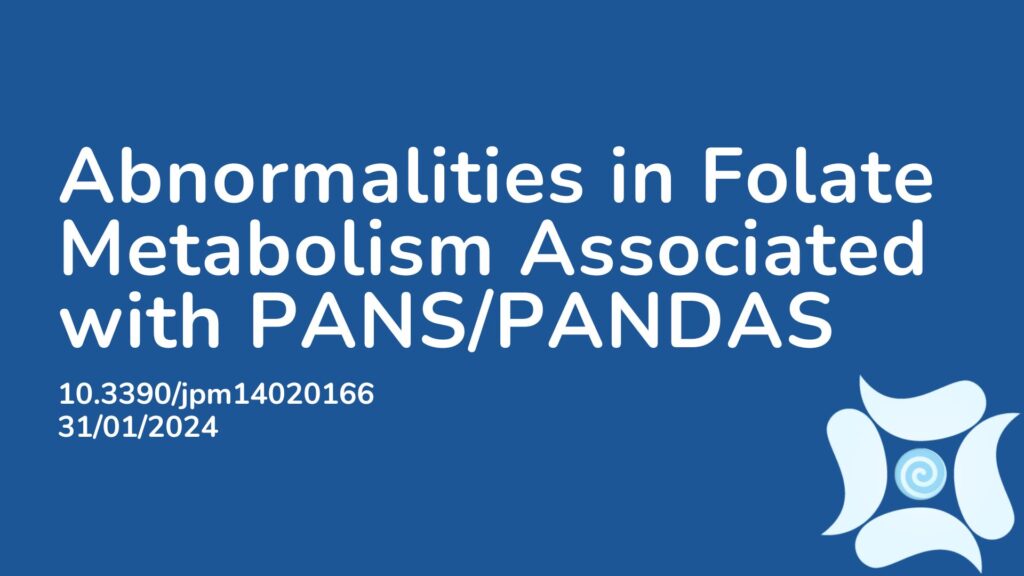Summary:
Neuropsychiatric Disorders Associated with Streptococcal Infections (PANDAS) and Pediatric Acute-Onset Neuropsychiatric Syndrome (PANS) are autoimmune conditions affecting pre-pubescent children, characterized by sudden onset obsessive compulsive disorder (OCD), tic disorders, and neurological abnormalities linked to streptococcal infections. Treatment typically includes addressing infections, providing psychiatric support, and immuno-modulatory interventions. However, some cases do not respond well to first line treatment, suggesting underlying conditions may also contribute, such as cerebral folate deficiency (CFD). CFD shares symptoms with PANS/PANDAS and has been linked to disorders resembling PANS/PANDAS, including depression and schizophrenia. Folate, crucial for brain function, is transported into the brain by the folate receptor alpha (FRɑ). One of the main causes of FRɑ dysfunction are FRɑ auto-antibodies (FRAAs), which bind to the FRɑ and inhibit folate transport. Some studies suggest that folate abnormalities play a role in ASD cases due to triggers from environmental factors that induce the production of FRAAs. This paper proposed that the FRAAs may also contribute to the symptomatology of PANS/PANDAS. To test this hypothesis, 47 patients diagnosed with PANS/PANDAS were analysed for FRAAs. 63.8% of PANS/PANDAS patients were found to have either the blocking and/or blinding FRAAs. Patients who took folate in the form of Leucovorin, also responded well and showed an improvements in symptoms. This data, for the first time, showed that PANS/PANDAS is associated with FRAAs and suggest abnormalities with folate metabolism may contribute to the presence and symptomatology of PANS/PANDAS.
Abstract:
The folate receptor alpha autoantibodies (FRAAs) are associated with cerebral folate deficiency (CFD) and autism spectrum disorder (ASD). Both of these syndromes have overlapping characteristics with Pediatric Autoimmune Neuropsychiatric Disorders Associated with Streptococcal Infections (PANDAS) and Pediatric Acute-Onset Neuropsychiatric Syndrome (PANS). Thus, we propose that the FRAAs may contribute to the symptomatology of PANS/PANDAS. To test this hypothesis, 1 mL of serum from 47 patients (age range = 6–18 years old) clinically diagnosed with PANS/PANDAS was sent to Vascular Strategies (Plymouth Meeting, PA, USA) for analysis of FRAAs. Moreover, 63.8% of PANS/PANDAS patients (male = 15; female = 15) were found to have either the blocking and/or blinding FRAAs, with 25 (83.3%; male = 14; female = 11) having binding FRAAs, two (6.7%; all female = 2) having blocking FRAAs, and 3 (10%; male = 1; female = 2) having both binding and blocking. Furthermore, surprisingly, ASD was associated with a 0.76 lower binding titer (p = 0.02), and severe tics were associated with a 0.90 higher binding titer (p = 0.01). A case of a FRAA-positive patient is provided to illustrate that a treatment plan including leucovorin can result in symptom improvement in patients with PANS/PANDAS who are FRAA-positive. These data, for the first time, demonstrate that PANS/PANDAS is associated with FRAAs and suggest folate metabolism abnormalities may contribute to PANS/PANDAS symptomatology. Further studies investigating the therapeutic nature of leucovorin in the treatment of PANS/PANDAS are needed. Such studies may open up an alternative, safe, and well-tolerated treatment for those with the PANS/PANDAS diagnosis.
Article Publication Date: 31/01/2024
DOI: 10.3390/jpm14020166




